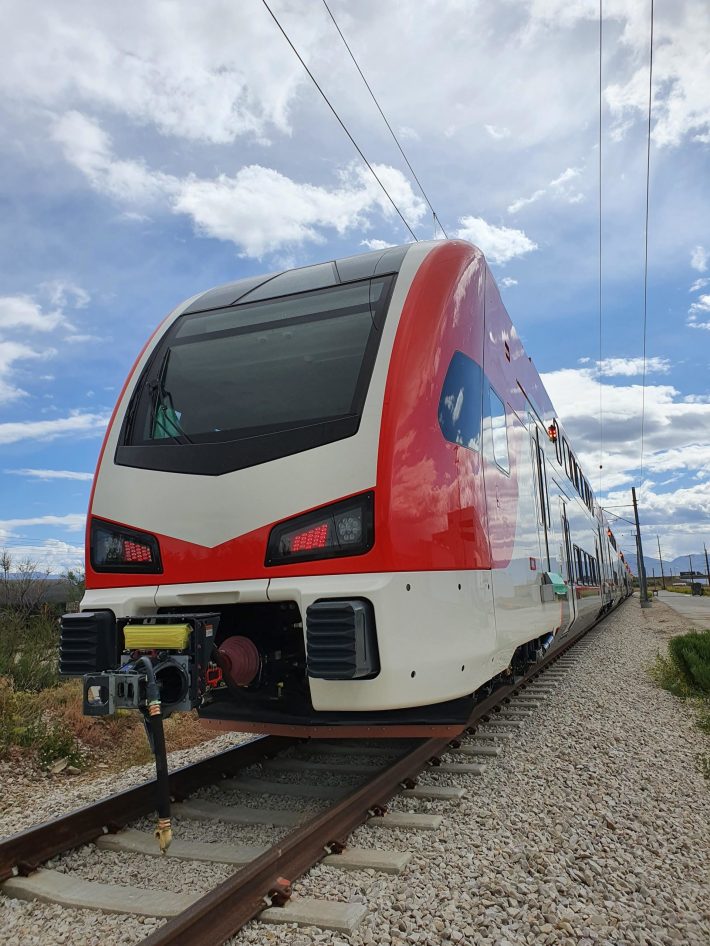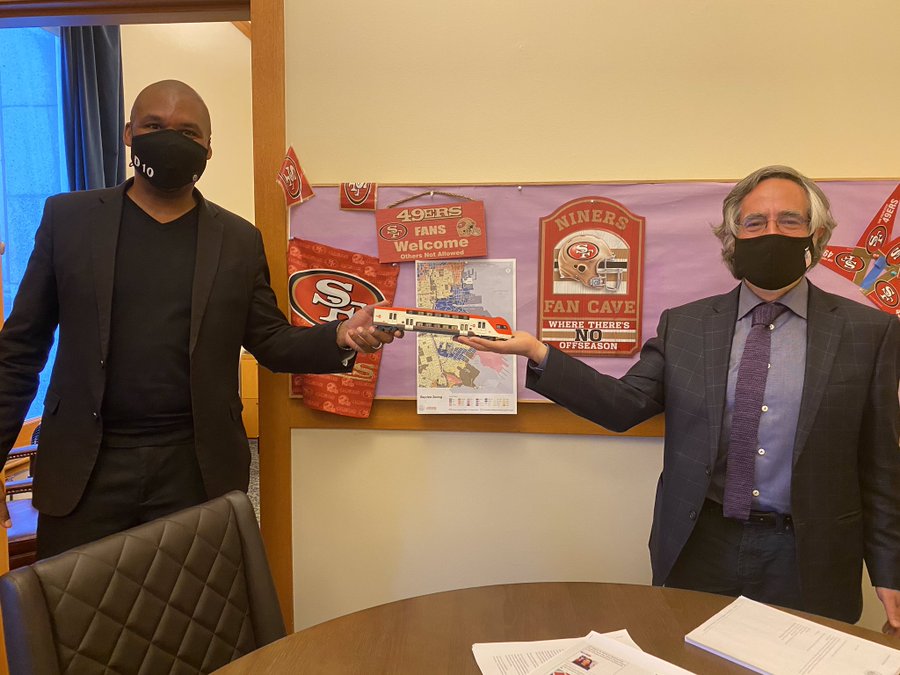Note: GJEL Accident Attorneys regularly sponsors coverage on Streetsblog San Francisco and Streetsblog California. Unless noted in the story, GJEL Accident Attorneys is not consulted for the content or editorial direction of the sponsored content.
The San Francisco Board of Supervisors voted unanimously Tuesday evening to pass an amended, conditional measure supporting a one-eighth cent Caltrain sales tax for the November ballot. This was despite some 40 advocates who came to speak in support of a 'clean' Caltrain measure--one that did not add conditions and would have a better chance of getting approved by two-thirds of voters.
As previously reported, the tax, if passed by voters, is expected to raise $108 million annually for Caltrain. The money was intended to help Caltrain expand its new electric services (pictured below, slated to roll out to passengers in 2022) and start offering BART-like service, with trains coming roughly every 15 minutes in each direction. Precipitous drops in ridership and revenue due to the COVID-19 pandemic added even more gravity to the arguments in favor of this tax, since without it or a significant, ongoing cash infusion from other sources, the railroad would will have to all-but shutter in the coming months.

The measure, first authorized by state legislation (SB 797), also has to be cleared by the San Mateo and Santa Clara Supervisors. San Mateo County passed a "clean" version of the measure that conformed to the original legislation, simply providing a revenue source for Caltrain. Earlier this month Supervisors Aaron Peskin and Shamann Walton attempted to amend the measure, providing more leverage to San Francisco, by requiring the tax proceeds to be placed in an escrow account, pending "governance reform." Releasing the money would require a two-third "supermajority" of the Caltrain Board, which has three representatives from S.F., San Mateo and Santa Clara each. This was done by Peskin and Walton in an attempt to wrestle control of Caltrain away from SamTrans, which currently operates the railroad.
Supervisor Matt Haney, who supported Peskin and Walton's amended endorsement of the measure, said at last night's hearing that Caltrain is essential to people in his district and the region, but "it’s one of the few transit systems without its dedicated revenue source." He added that passing the measure--if approved by voters in November--would finally change that, giving Caltrain a more dependable funding stream.
The Board of Sups will hold special hearing today on proposed Caltrain 1/8 cent sales tax measure
— Matt Haney (@MattHaneySF) July 28, 2020
2 weeks ago it was presumed dead, which was unacceptable to me and others, today we will have a hearing & vote, and hopefully it will pass across 3 countieshttps://t.co/neI4IIy68A
However, now San Mateo County has to backtrack and vote to sign off on the amendments. It's unclear if that can happen. "The alternative sales tax measure adopted by the San Francisco Supervisors is encumbered with conditions such as withholding funds, supermajority voting requirements, and demands for actions related to the governance and structure of Caltrain. San Mateo County Counsel John Beiers and San Mateo County Transit District Special Counsel James Wagstaffe have both opined that such conditions are illegal as they are not permitted by the legislation enabling the sales tax (SB 797) which calls for a stable and dedicated funding stream for Caltrain," wrote the Chief of Staff for San Mateo County Supervisor Dave Pine in a statement issued shortly after the San Francisco vote.
San Francisco officials have not yet responded to questions about how the ballot language would be drafted, based on the now-conflicting resolutions from San Mateo and San Francisco.
Peskin, meanwhile, during yesterday's Board of Supervisors meeting insisted that "...this is not a power grab, but the best time to have this conversation is when money is on the table." He also said he and other representatives have "...driven up and down the Peninsula" meeting with San Mateo and Caltrain officials, adding it is "...time to extract Caltrain from SamTrans." One of the key points of contention between Caltrain and Peskin, apparently, is over how much developable land exists along the corridor. Caltrain officials insist that nearly all its land is needed for the tracks and future expansion of service. San Francisco supervisors believe there is developable land.
Advocate Adina Levin of Friends of Caltrain referenced that in a wry tweet sent after the vote:
I just got a fact check about the amount of acreage that Caltrain controls. It's correct if you take the corridor length (60miles) and multiply by the average width (100feet), and remove the tracks.
— Adina Levin (@alevin) July 29, 2020
Levin was one of the advocates who spoke before last night's vote. She said adding contingencies to the S.F. measure "...is putting a lot of risk of the back of riders," noting that complicated ballot measures usually fail. "We do support governance change and upgrades at the regional level," she added, calling for a 'clean' ballot resolution that conforms to SB 797.
Ian Griffiths of Seamless Bay Area also spoke, and said the amendments are so complicated even he is having difficulty understanding them. "And I'm a transit professional." He urged the Supervisors to think of the riders first, in a more regional way. "The governance issues that have been attached to this ballot measure don’t really have anything to do with riders." Andrew Sullivan, a 20-plus year Caltrain rider and former chair of the advocacy group Rescue Muni, urged the board "...to pass the sales tax with no encumbrances or conditions," adding that he considered it an "outrage that this board has decided to hold riders hostage to a bureaucratic fight."
Walton and Peskin also continued to take a pounding on social media.
Another speaker accused Peskin and Walton of "playing politics... it is a power grab and you’re on damage control now."
"What’s at stake is a lot of land," said Peskin. "There are somewhere around 700 acres within the Caltrain ROW. Many are developable for smart growth and affordable housing."
“We remain hopeful that San Mateo representatives will join us in supporting this resolution,” Walton said at the meeting. "We all believe Caltrain is an incredible asset.”





